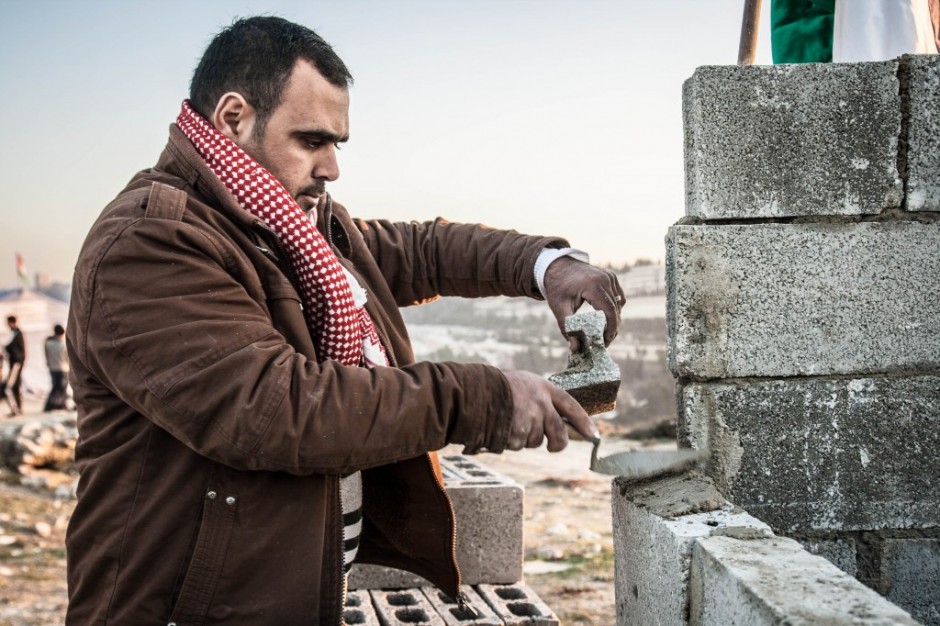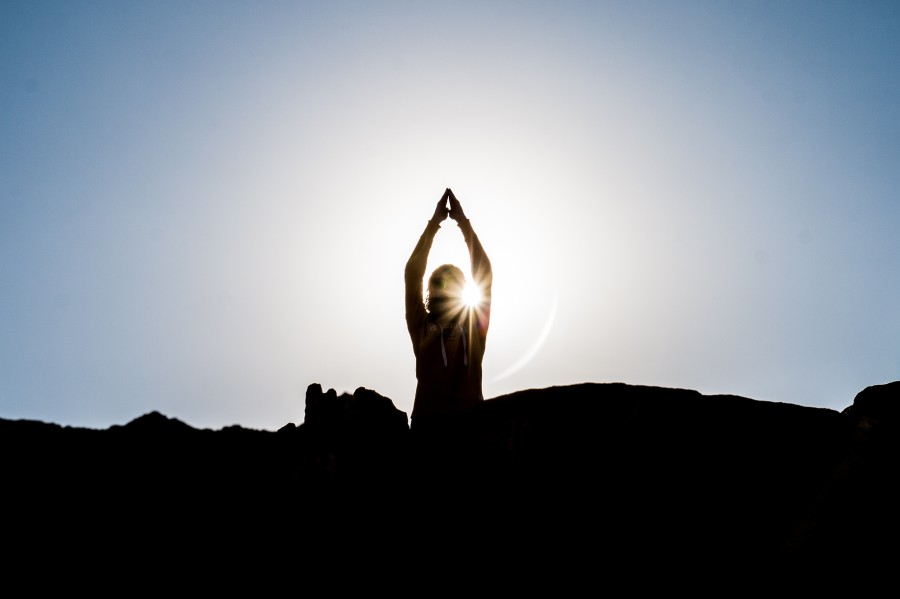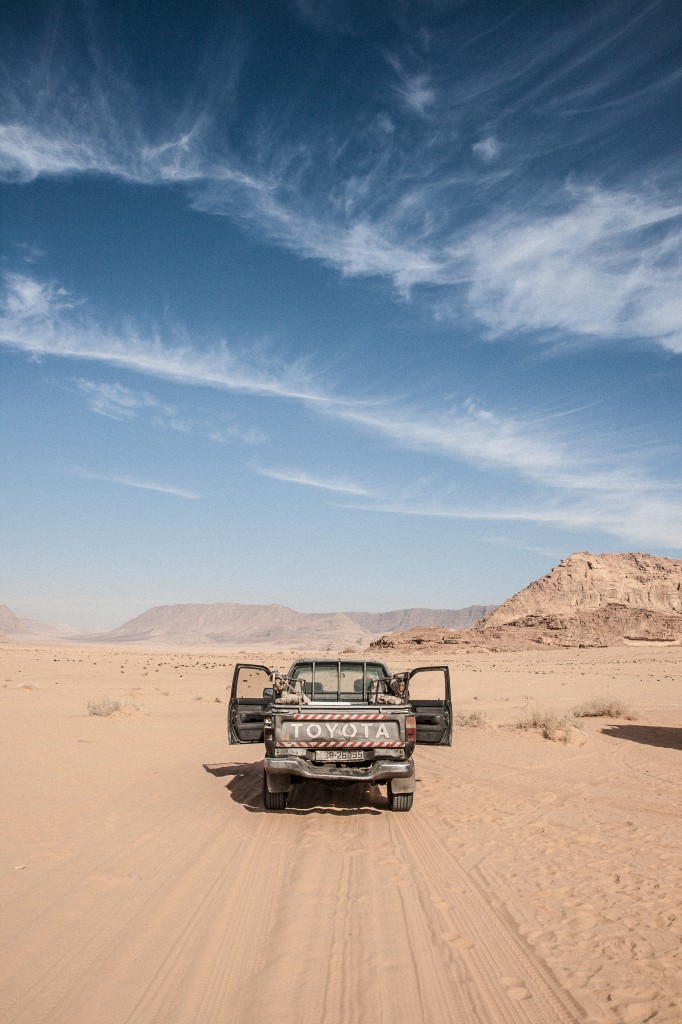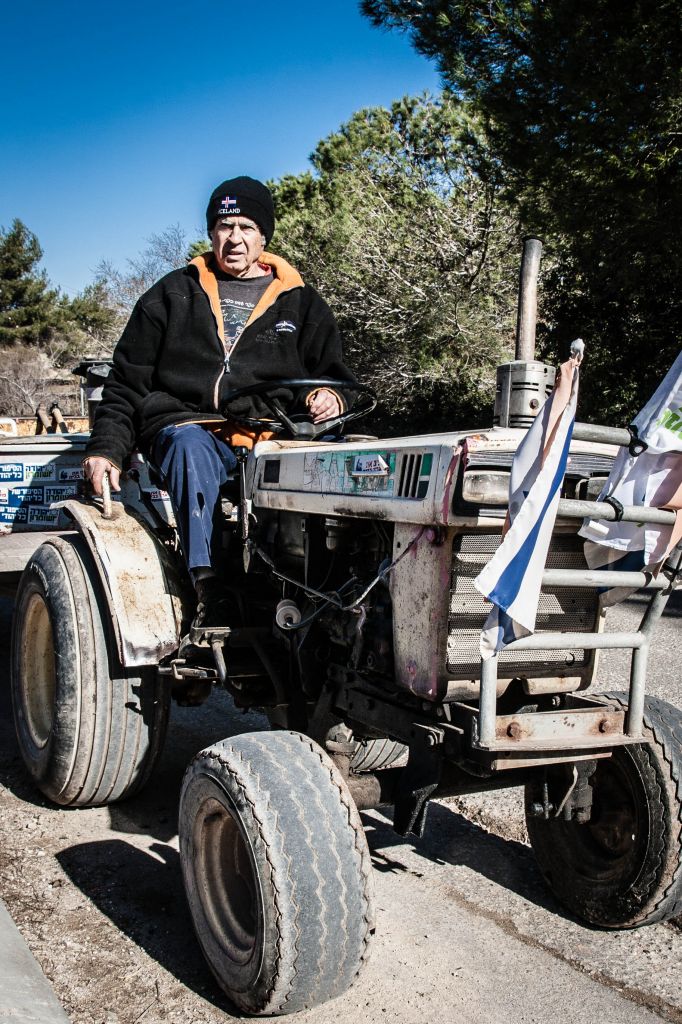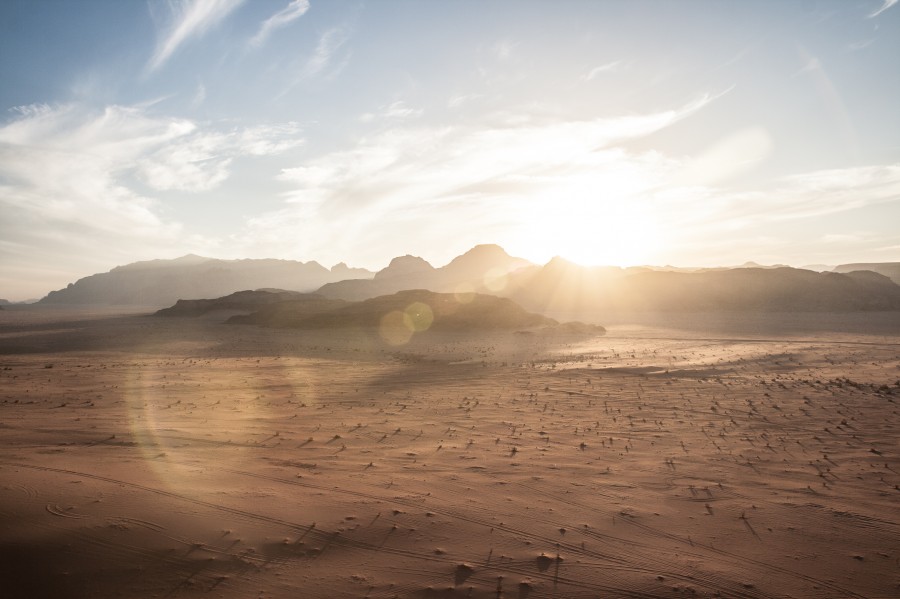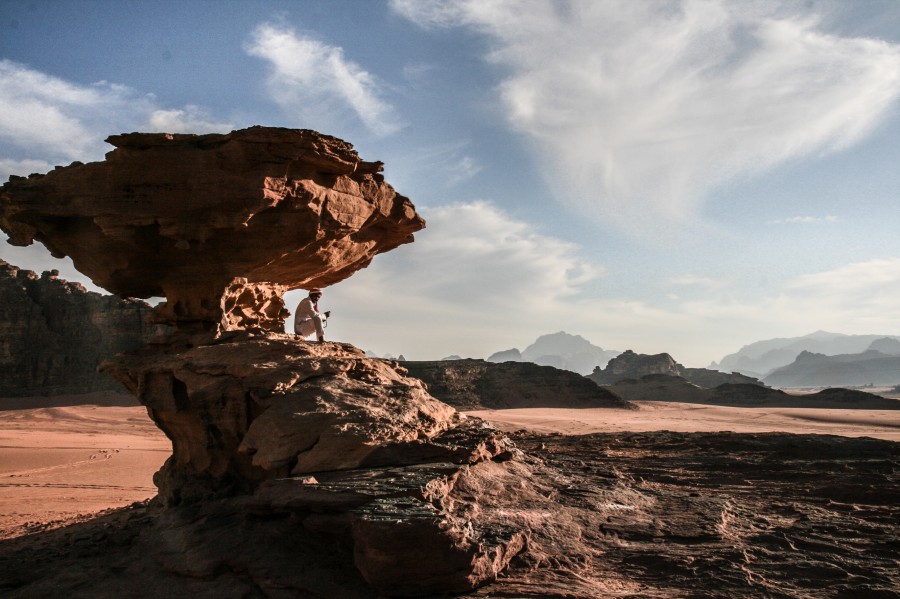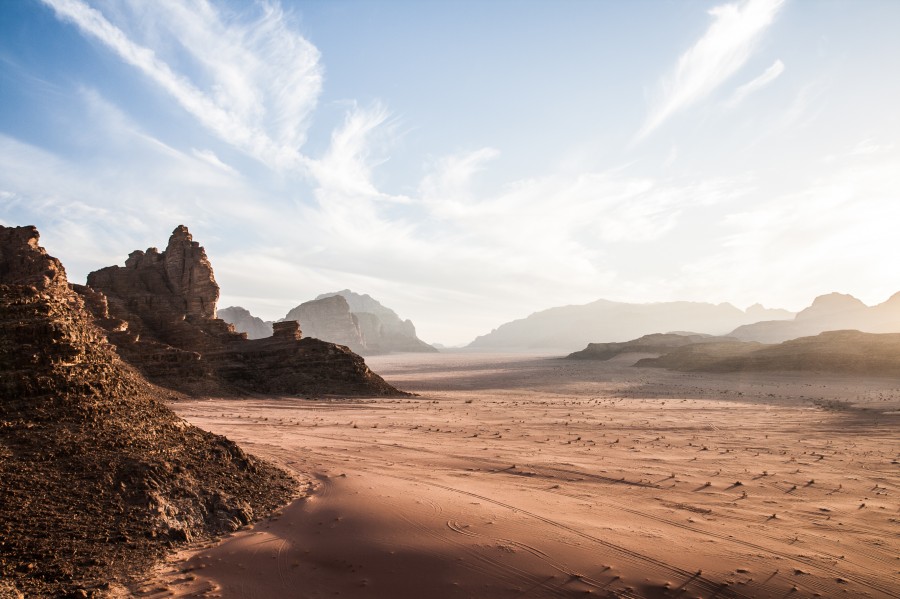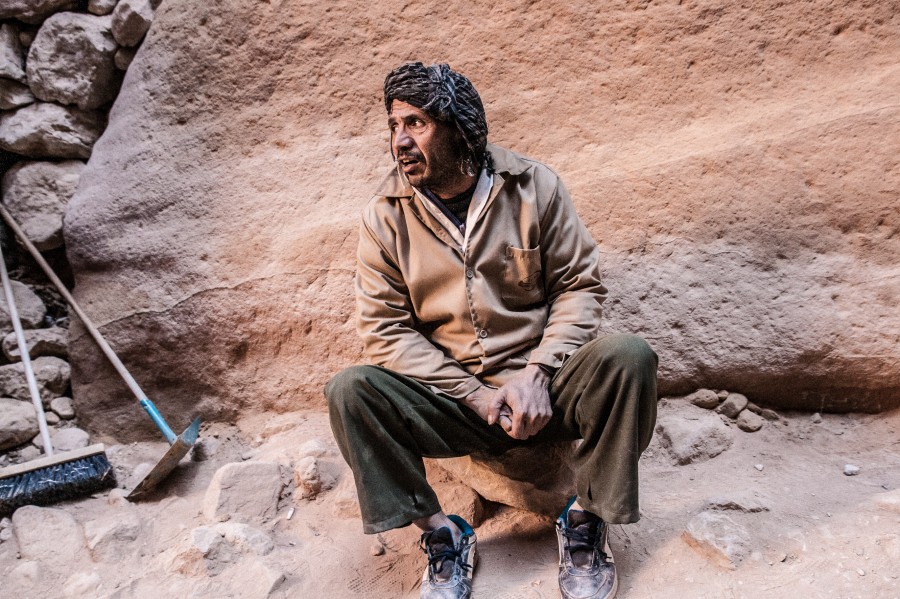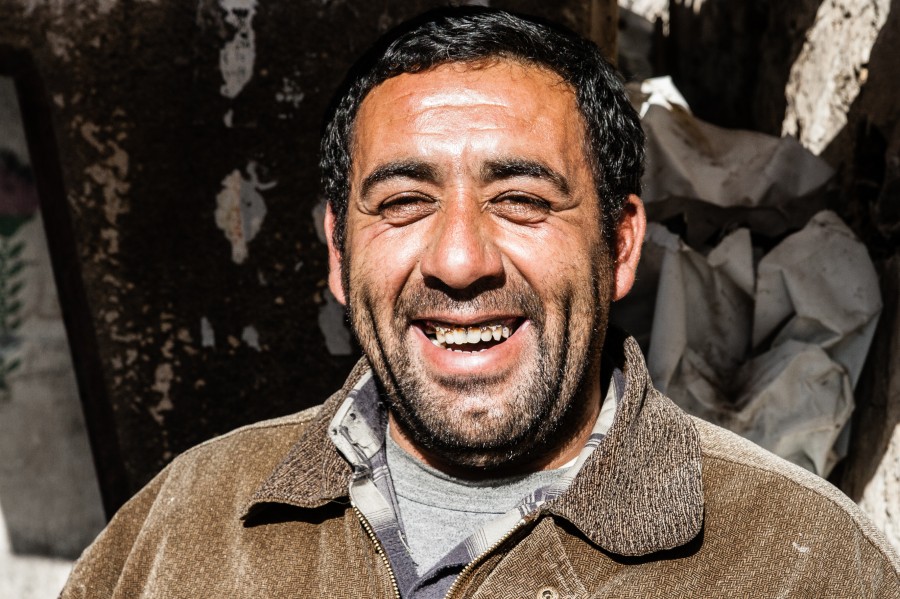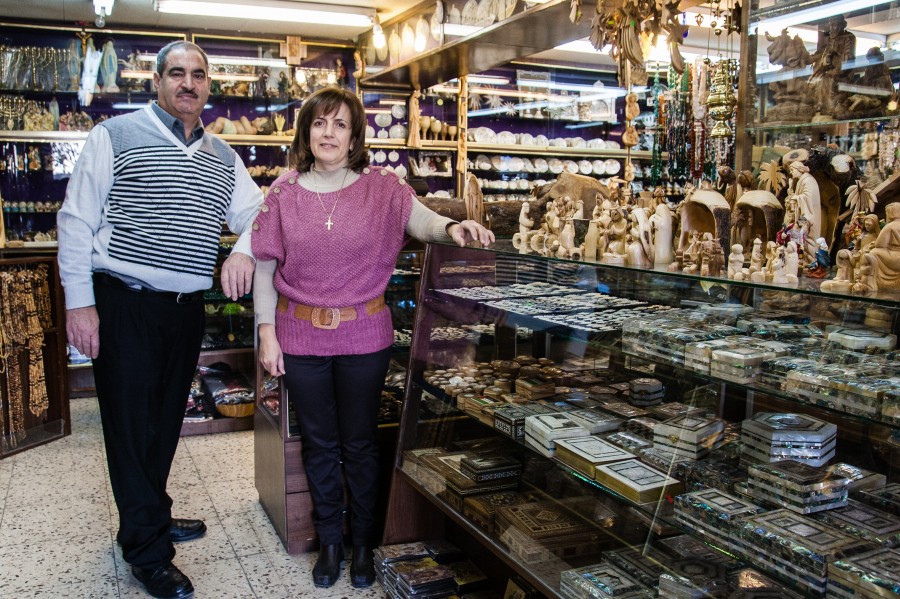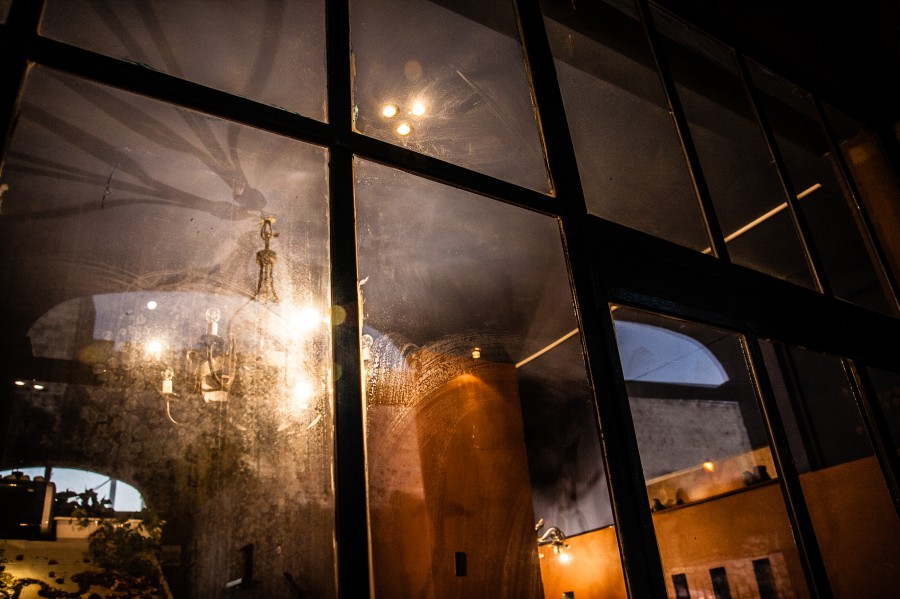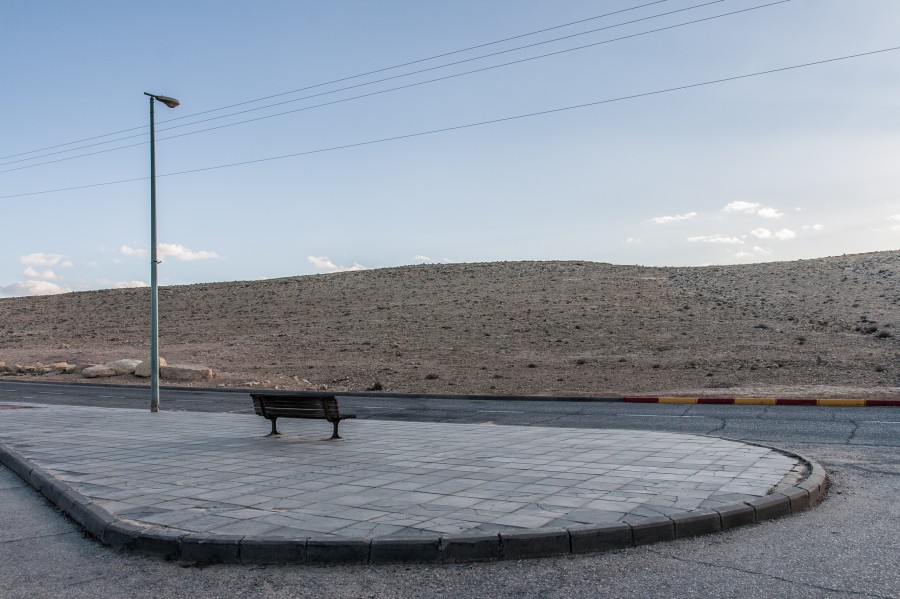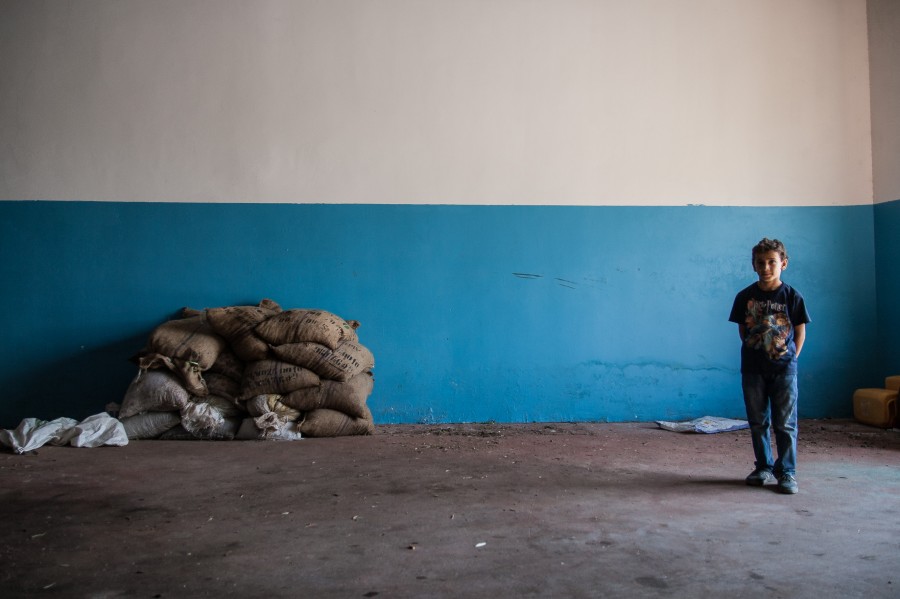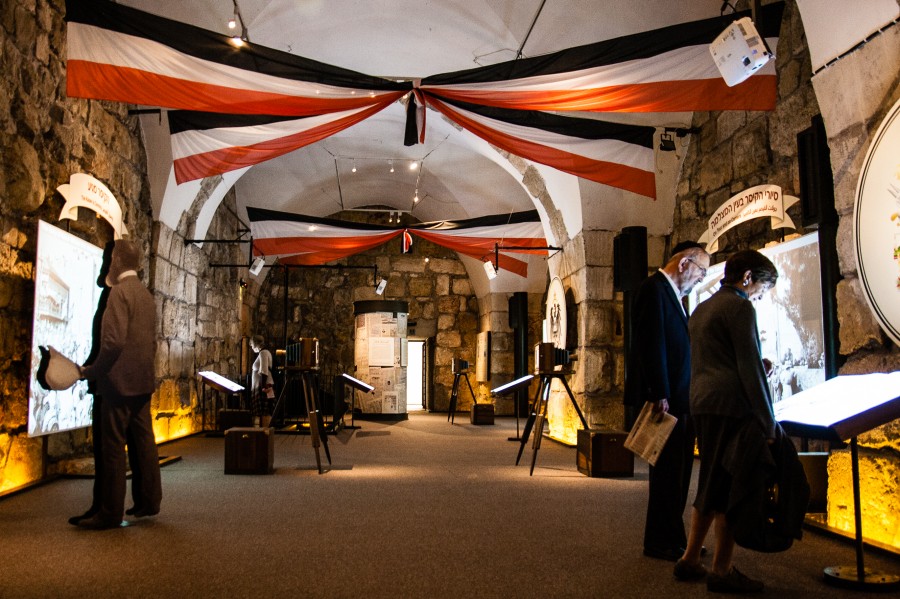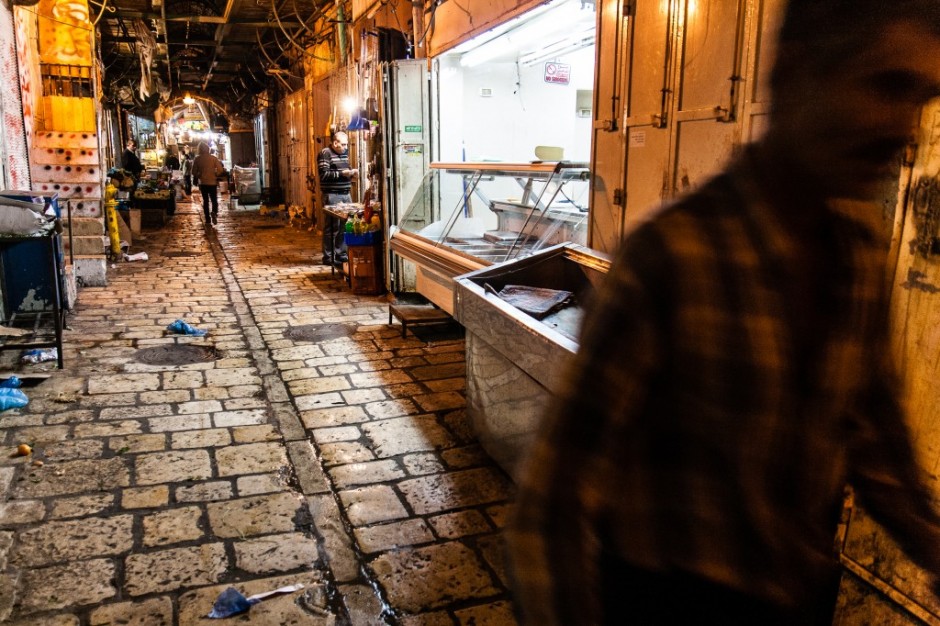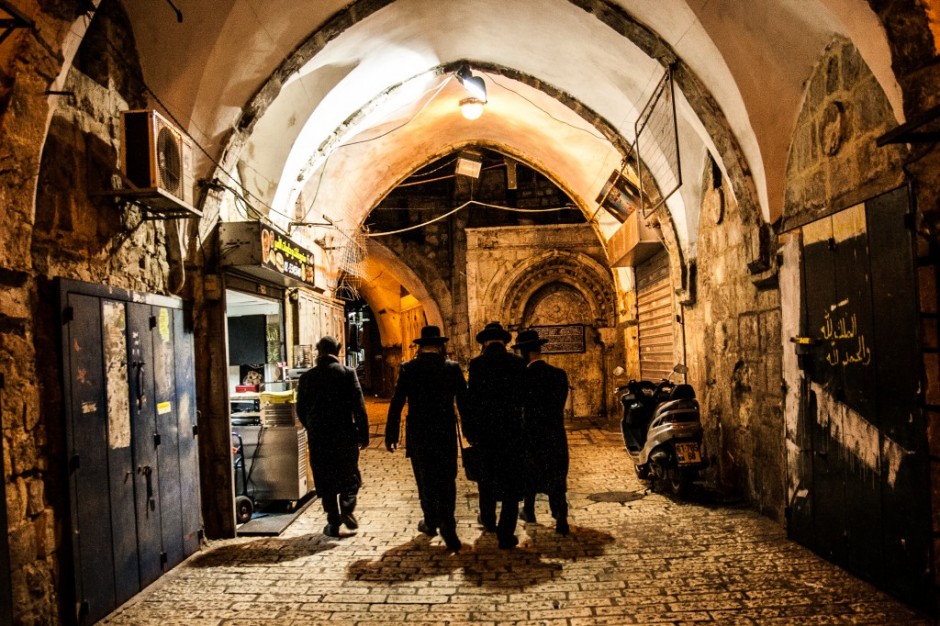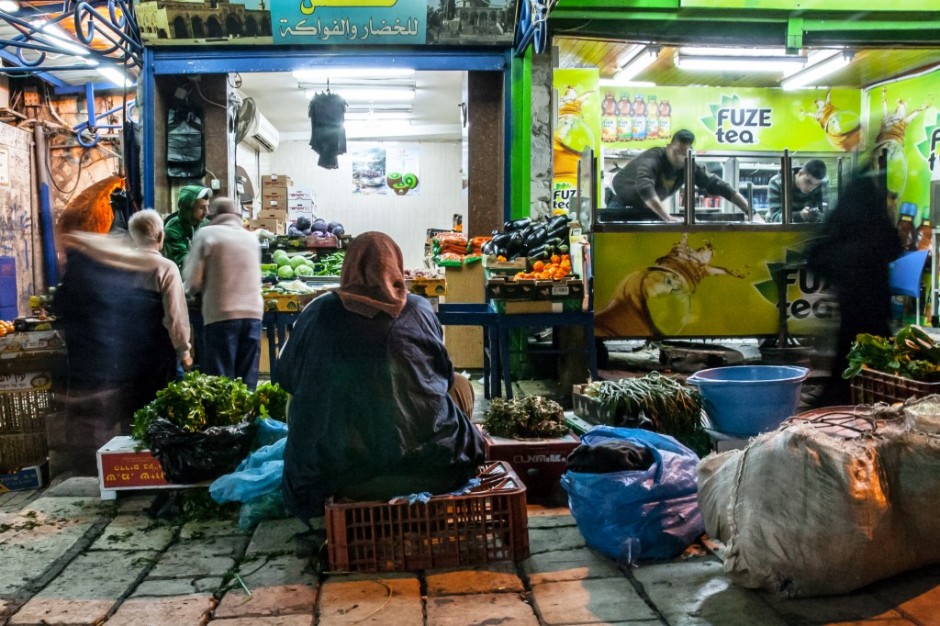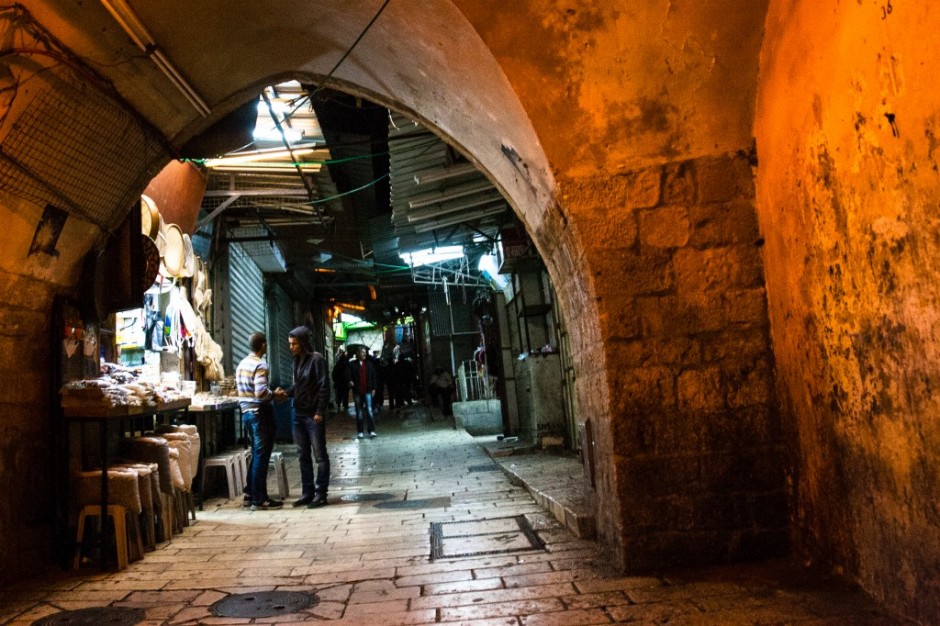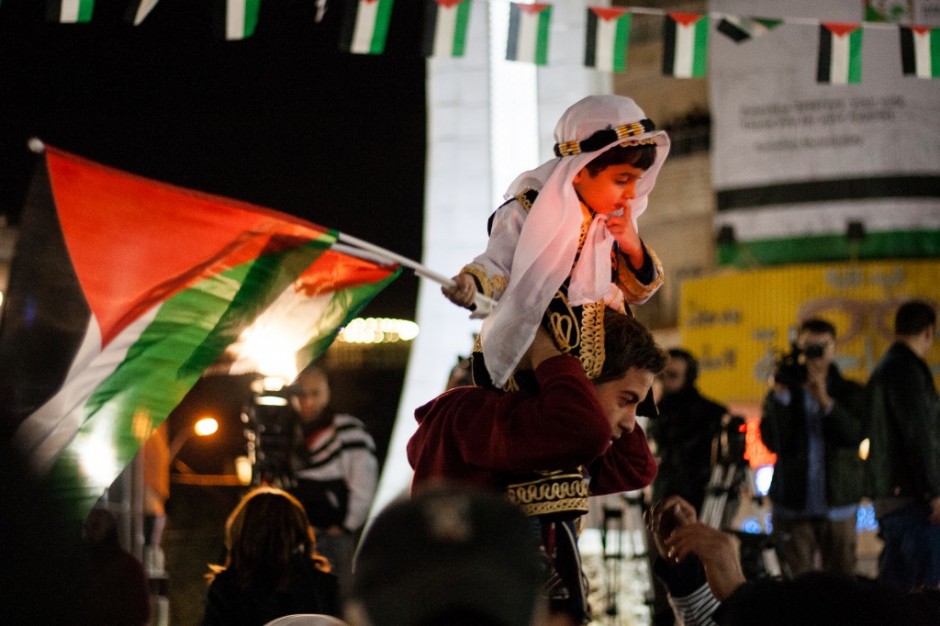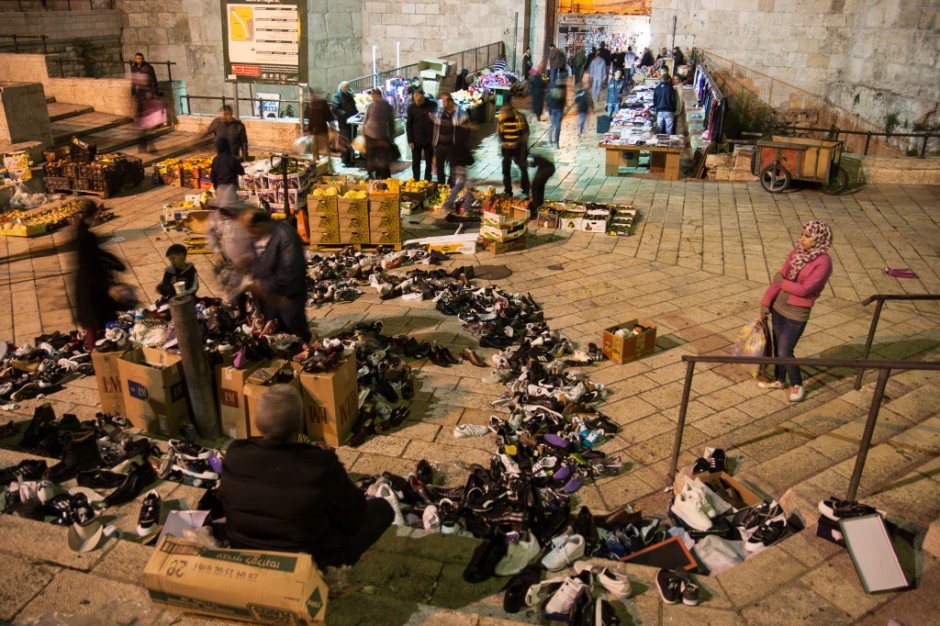Somewhere in the Sahara, July 2014

Rico Grimm
text. social media. moderation. foto.

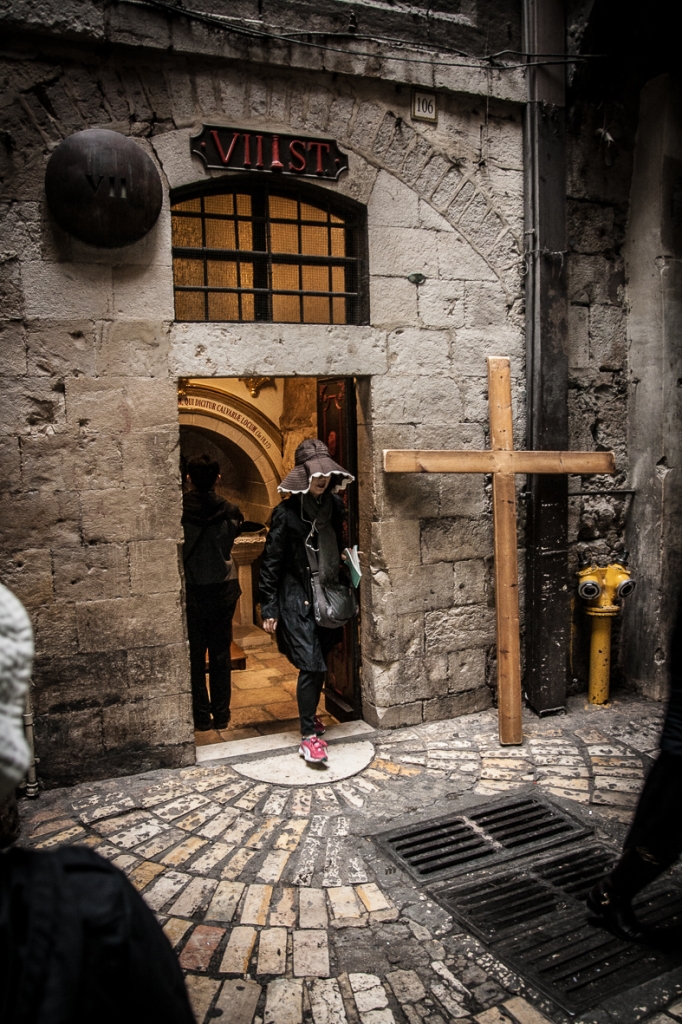

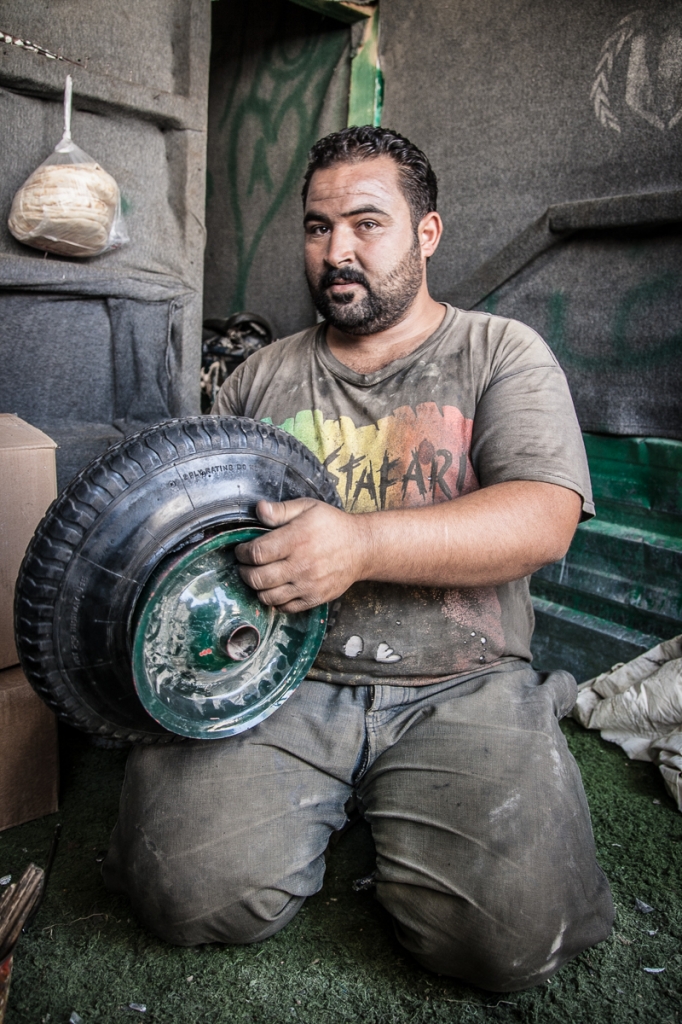
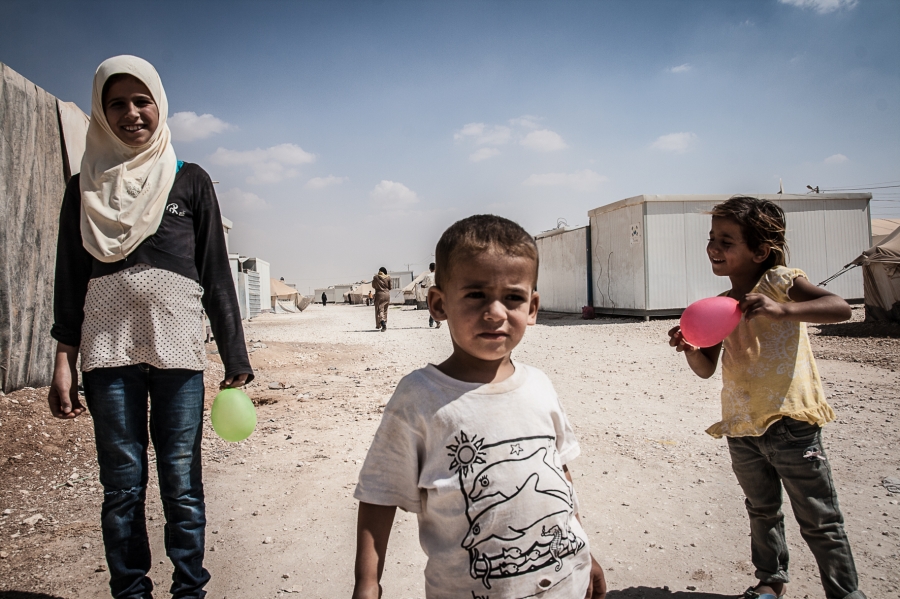
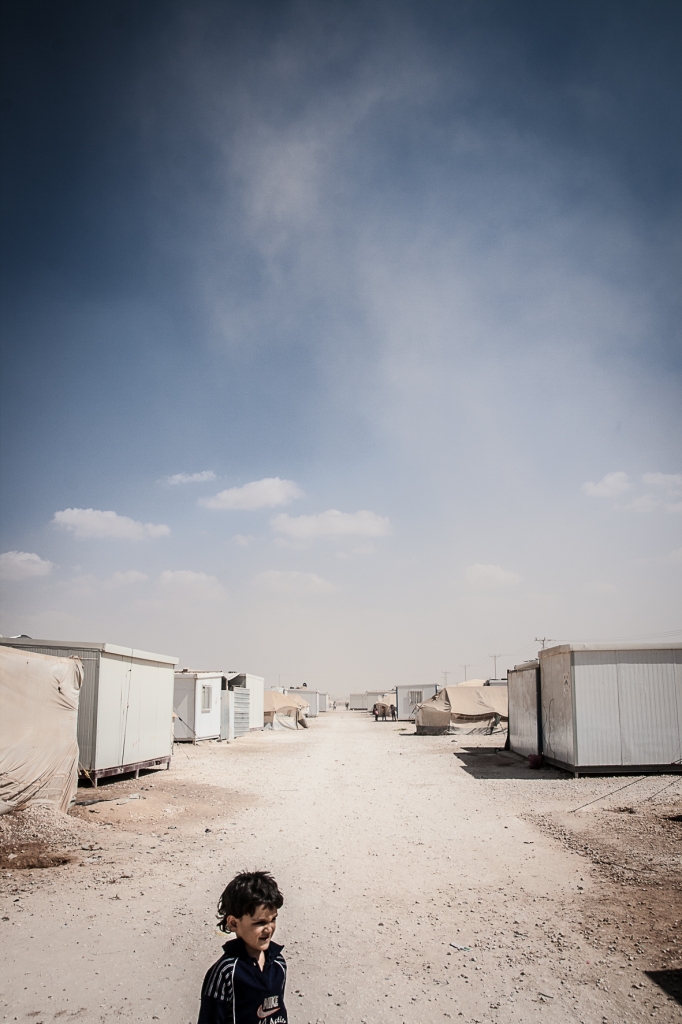
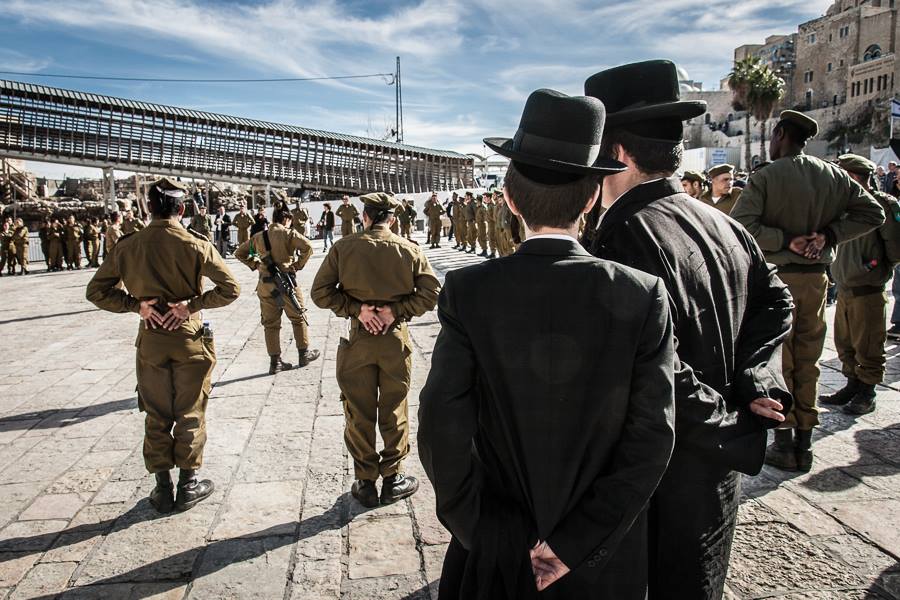
When the beards get longer, the hats weirder, the guns bigger, the domes more golden and the ailes more narrow, when the trams get too crowded, your roomies french, the politics more complicated, the stones whiter, the hill slopes smoother, the cabbies more rude and the sky clearer – then you know that you are in Jerusalem again. Hello!
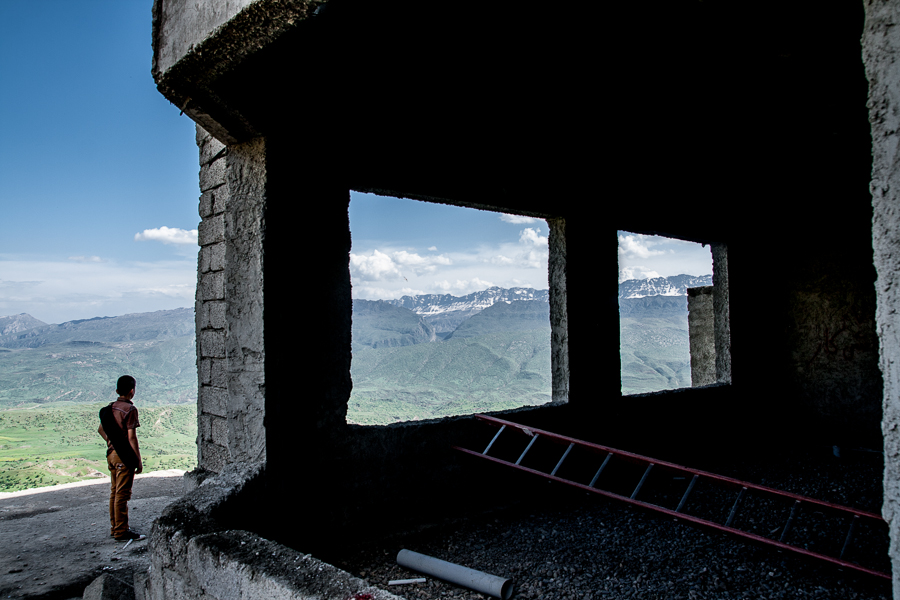
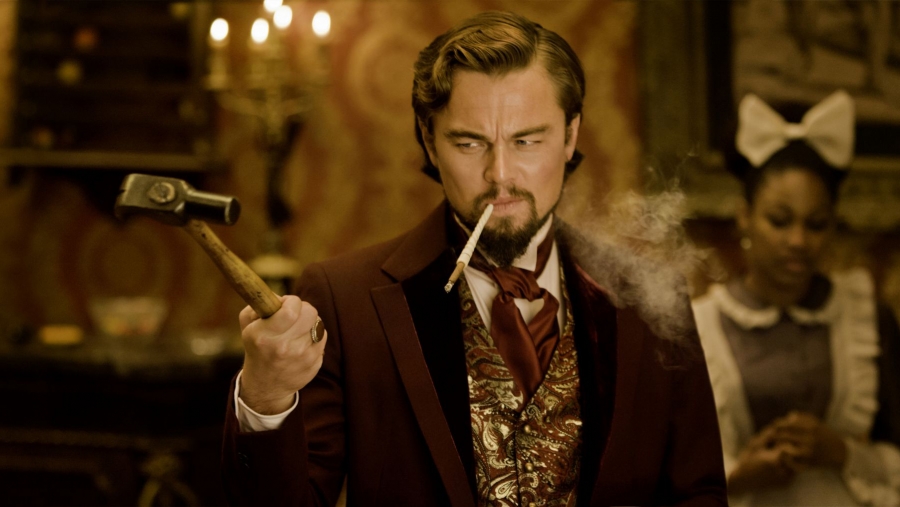
This is a very interesting read.For Germans, Americans, Israelis, Palestinians, Australians, Kurds, Turks. For everyone, actually. Because – without questioning the singularity of events – I cannot think of one nation who did not stomp over other peoples rights in its history. (If you can, let me know) Inflicting sorrow to their fellow humans is a common trait of all people. Take that into account, try to fully understand what it means that there is no “good nation”, no “light unto the nations”, no “God’s own country”, that in the end nations always do good *and* bad – it becomes a lesson of humbleness you can not forget nor ignore. That is why coming to the terms with the past is so important.
Photo: Scene from “Django Unchained”
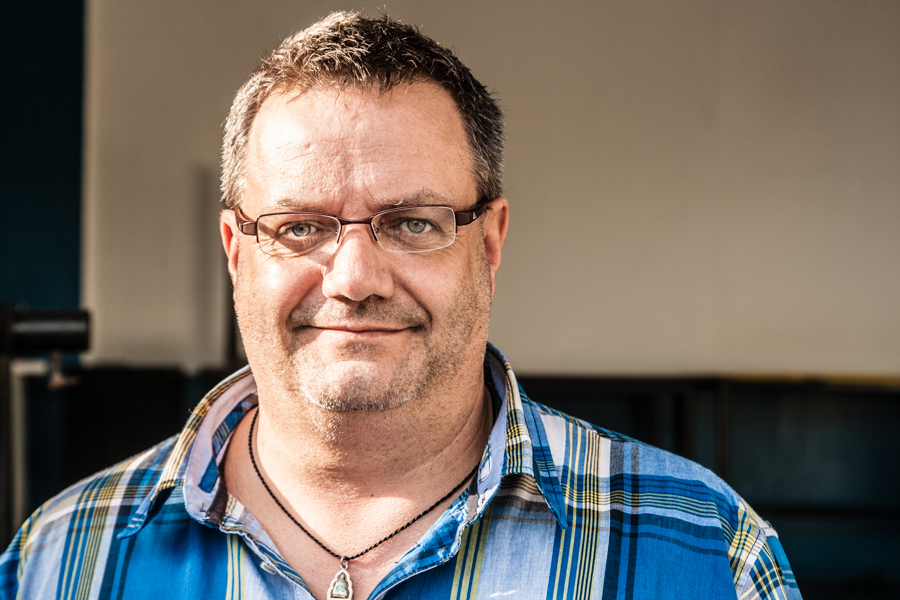
This is Gunter, he owns a German restaurant in Iraq, in Erbil, the capital of the semi-autonomous region of Kurdistan. Ordering a beer in his restaurant was a small home-coming for me. Because the beer was brewed 10km away from where I grew up. The food Gunter cooked was the same my grandma always prepared for me.
Gunter comes from a small town in Thuriniga, in the middle of Germany. Him owning a restaurant in Iraq was not a propect he could have fathomed some 25 years earlier. It was the fall of 1989 when he went for “a walk” and demanded freedom of movement, when he demonstrated against the government of the German Democratic Republic. In a childish move of vengeance this government enlisted him for military service. A couple of weeks later the Wall came down and the East-German forces were reunited with their West-German counterparts. Gunter stayed in the army and did what he had learned. He cooked. In Bosnia, in Kosovo, in Kabul. It was in the Afghan capital that he opened his first restaurant in 2003. Times were good at that time in Afghanistan. Everybody was optimistic, Gunter recalls. With every bomb attack this optimism vanished further, making him closing his restaurant in the process. 30.000 Euros were lost. He started again in Iraq. Same story here: many Internationals, optimism, no competition. This time it worked. Gunter wants to open his next restaurant on the island of Sri Lanka.
When I was asking Gunter what he thinks of Germany, if he would go back, he replied: “What could I possibly want there?”

This is Hesam Misaghi, a 25-year old Iranian. Other Iranians are electing a new president today. He lives and soon studies in Berlin and has not seen home since three years. He is a dissident, he took part in the so called “Green Movement” which almost toppled the Iranian regime four years ago. But only almost.
But the oppression started for Hesam even earlier – because he is a Bahai, a member of a religious group that the Iranian government dsicriminates against. Once, he was five year old, did he visit his grandparents. This happened (in his words):
The door bell rang and when my grandparents opened they saw two bearded guys who began to search the apartment. After they found the library of my grandpa they confiscated his books. My uncle had deposited his whole collection of Tin-Tin-comics there. My favourite adventure was Tintins Journey to the Moon and I had to watch helplessly how these bearded guys took away the comics. They were not stupid, they knew exactly that Tintin is harmless. But they liked them and they had the power to take them away. I was really sad.
It started with comic books, in 2009 the police threatened to arrest him because he was a dissident blogger. They had already jailed seven of his friends. Hesam had to flee.
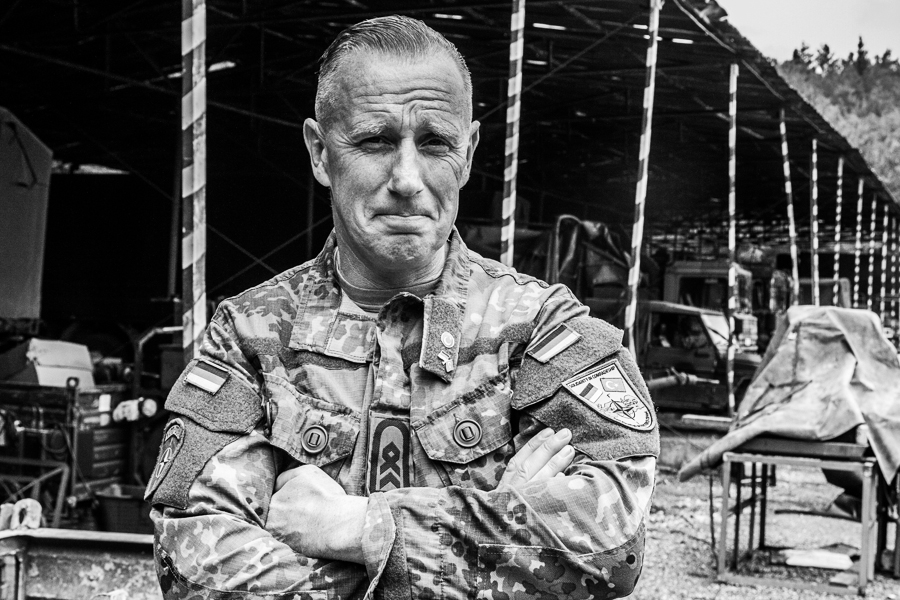
This is Thomas W., technician with the German army. Being part of a Nato-deployment, he was stationed in South Turkey for three months. Look at his shoulders, they tell alot about him – because they are empyty. Thomas W. wears his uniform badge on his breast.
He is a optimistic, funny guy from Hamburg trying to cope with the boredom of this deployment. In the back of the picture you can see the improvised workshop where he and his team tend to the cars and trucks of the German units.
You can read my full (German) report about this Nato-Operation here.
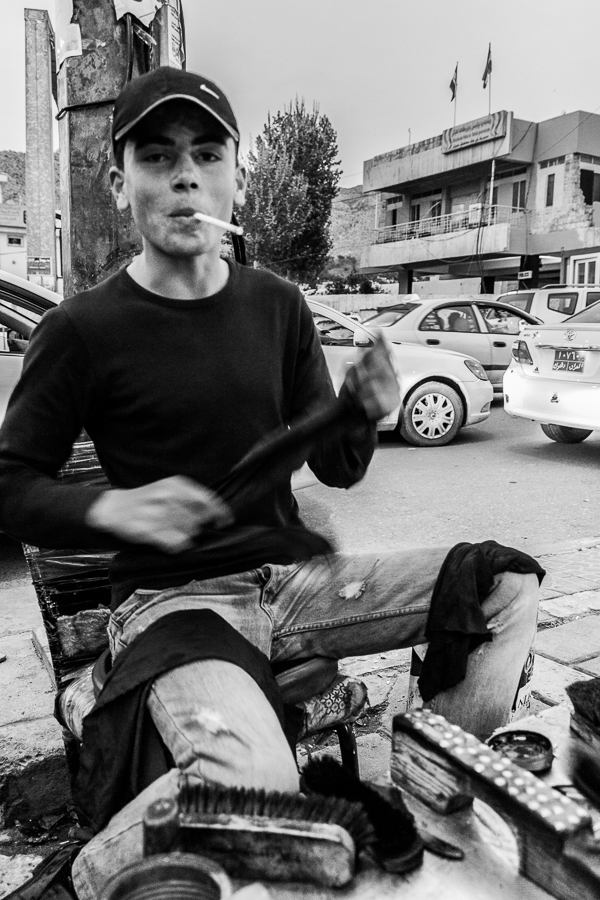
A Little shoeshine boy never gets low down
But he’s got the dirtiest job in town
Bendin’ low at the peoples’ feet
On the windy corner of the dirty street
Well, I asked him while he shined my shoes
How’d he keep from gettin’ the blues
He grinned as he raised his little head
Popped a shoeshine rag and then he said
Get rhythm when you get the blues
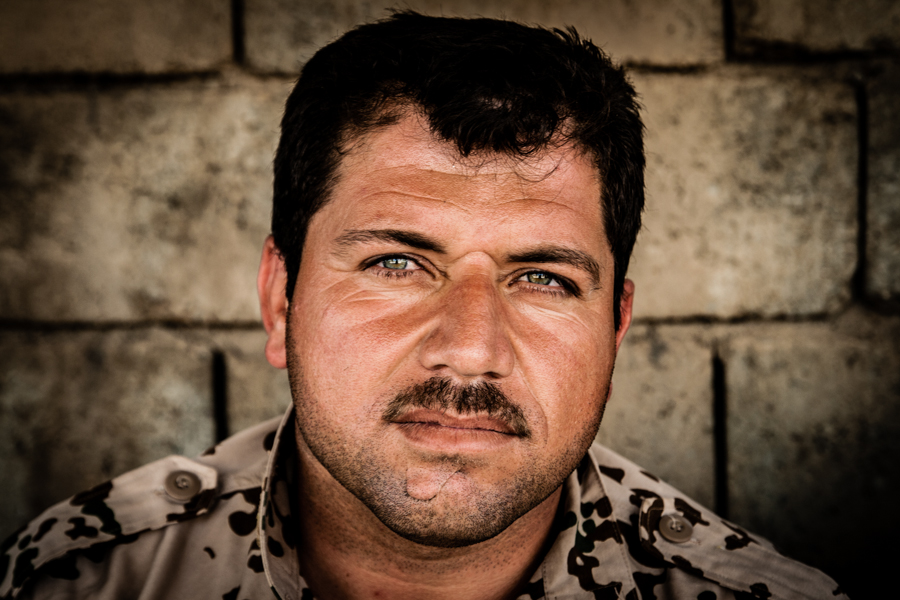
I met Halmat at a dusty bus station in the kurdish city of Koia. When the Americans started Operation “Enduring Freedom” to topple Saddam Hussein in 2003, he helped to liberate the city of Kirkuk. Today he works as a bodyguard of the deputy prime minister Kosrat Rasul, a former general, the “kurdish Che Guevara”, a living legend among the guerilla fighters of Kurdistan. Halmat is a Peshmerga, one of these guerillas.
Halmat speaks Kurd, Arabic and Fars. I do not speak any of his languages. Halmat showed me his duty pass on which all his credentials were printed in impeccable English – traces of the US-invasion. That’s why I know all this.
Route nach Sulaymaniyah, Irak auf einer größeren Karte anzeigen
Me and Halmat shared a cab from Koia to Sulaymania in the farther east of the Kurdistan Region. After we arrived, Halmat wanted to help me find a hotel but did not understand where I wanted to go. So, he handed me without saying a word his mobile phone. A man answered in German: “Hello? What’s up?” I heard a till ringing in the background. The voice on the other end of the phone gave us directions to the hotel. It belonged to Halmats brother who owns a shop in the German city of Aachen. The brother said finally: “Dude, I gotta run. The shop is full of customers. You know what Saturdays are like in Germany.” Oh yes, I know them.
But now, I too know what Saturdays are like in Kurdistan.
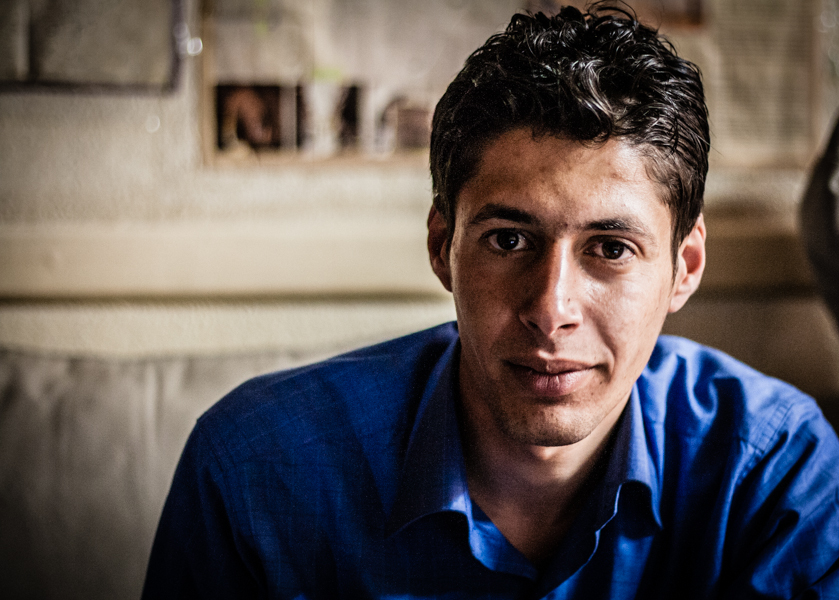
Azuz just laughed when I stepped into the smoky lobby of a hostel in Amman, Jordan. He made a comment about some actor I supposingly looked similar to. I had to join his laughter. Azuz was that kind of guy you like right from the beginning without knowing why.
He jumped in two large steps to the reception area, handed me a piece of paper to fill in my details. I wrote in the line of nationality “German”, he saw that and talked away. “Hallo, wie gehts? Wo kommst du her?” Berlin, Munich, he talked alot. But no, he has never been to Germany before. He taught that himself. He then conversed with a guy from Peru in Spanish, made a comment to an Italian girl in Italian and answered his phone in Arabic. I expected him in a moment to tell a joke in Suaheli.
Instead he told his story: He came to Jordan seven months ago with 5 Dinar, equalling maybe 8 Dollars, in his pockets. He was a student from Daraa in Syria, the town where the uprising began with a couple of Graffitis on the wall. He joined the first demonstrations. It was awesome, he says, we were strong and we had no fear. But the situation worsened.
Arriving in Amman he asked the supermarkets to give him a job. They gave him one and finally he got the offer to work in an environmental project that does fish research. He happily agreed and works there ever since. He loves that job alot. He did not even bother to attend a job interview with the refugee organisation of the UN he had been invited to.
And that might be a small, good sign. Because at home, in Daraa, he was studying veterinary medicine. His old life continues – at least a little bit.
Read further
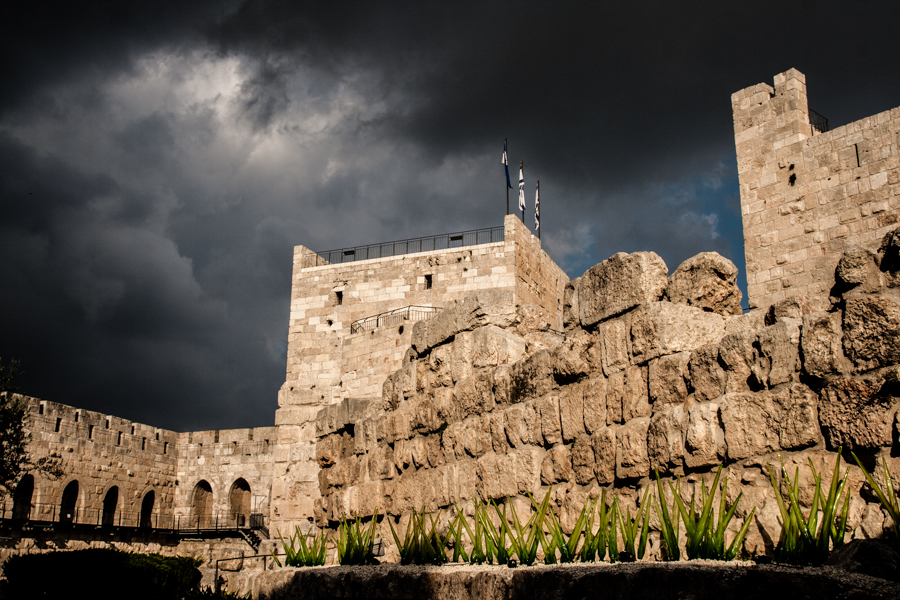
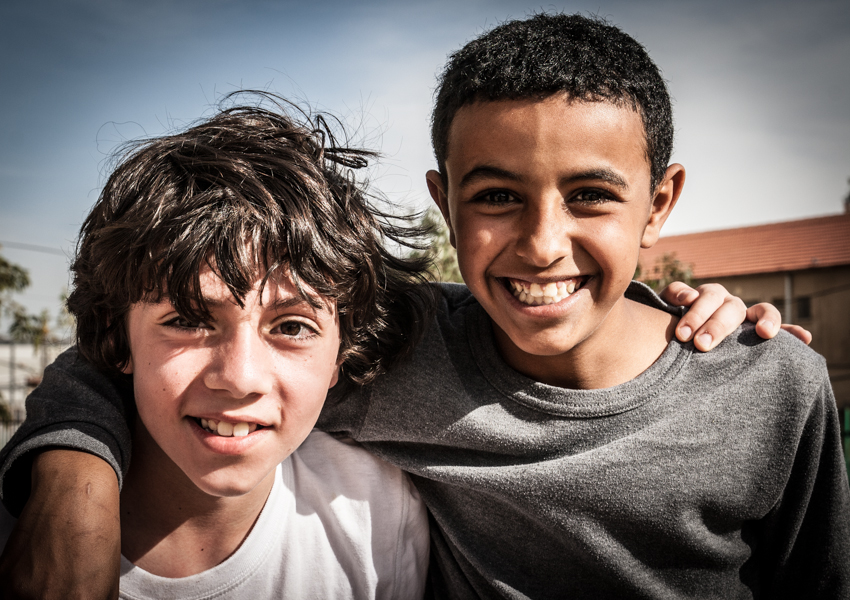
These are Itamar and Muthana. Itamar is a jewish boy and Muthana son of bedouins. They are best friends and attend the same class in a school in Be’er Sheva. That is special because the school system in Israel is segregated (like the rest of society). Schools like this are rare.
I am profiling Itamars and Muthanas school for a German kids magazine right now. I realised something interesting while writing the piece. Explaining this conflict on a kids level is actually really simple: “Two people, one home” like in “Two kids, one toy”. Even a reasonable solution is quite obvious on this basic level: “Share the home, share the toy.”
But explaining to a young audience why nobody solved the conflict yet if causes and solution are that well understood would be a tough call. Not only for me but the most knowledgeable scholars around, I guess. Is it because of a lack of talking to each other? A lack of venues to meet and exchange? A lack of good will?
It is a question of “process” in the end, of the path that leads from recognizing causes to reaching a solution.
That means for any iniative that is supposed to break this deadlock: If you cannot explain to a kid how you would go about it, you cannot explain it all.
It is bound to fail then.
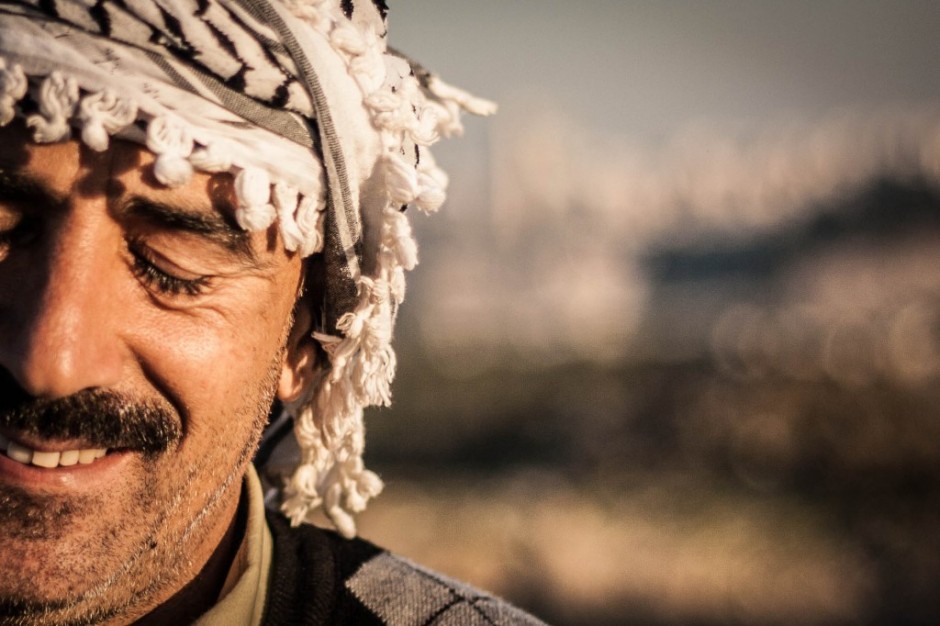
Said Yaqin, Head of Popular Struggle Comittee Beit Iksa, Palestinian Settler
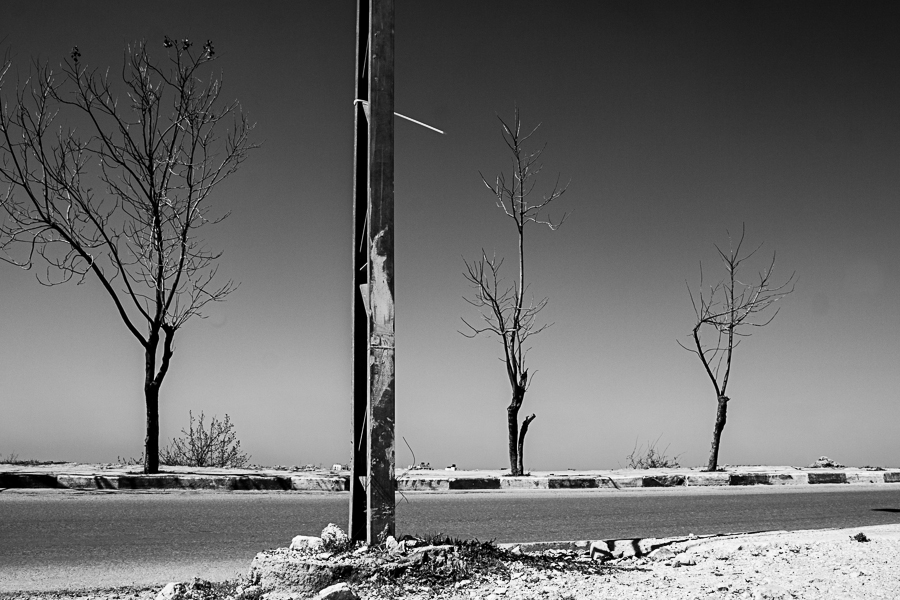

While we in Germany cast 3rd-class-models in our TV shows, Arabs cast the “Prince of Poets”. Thats an awesome thing to do. In the video you see palestinian poet Tamim al-Barghouti turning himself 2007 into the rock star of his people with just one poem, recited in one tv show. Its title: “In Jerusalem”.
Usually, when you ask a young jewish Israeli what this and this holiday is about they do not really bother to give you the details but sum it up as follows: “Somebody try to kill us, they did not suceed, let’s eat.” This line explains alot of festivals. But on Purim it is different, somewhat. According to the bible somebody tried to kill them (the Persians), they did not suceed (thanks to Esther)… let’s drink until we are completely drunk, that’s a talmudic ruling. The whole nation from the liberal, secular neighborhoods of Tel Aviv to the ultraorthodox Jerusalem-quarter of Mea Shearim descends into a five-day-craze that is very similar to carnival in christian countries (who copied whom is not known). People dress up und you meet drunk Santa Claus, Zombies and Bees.
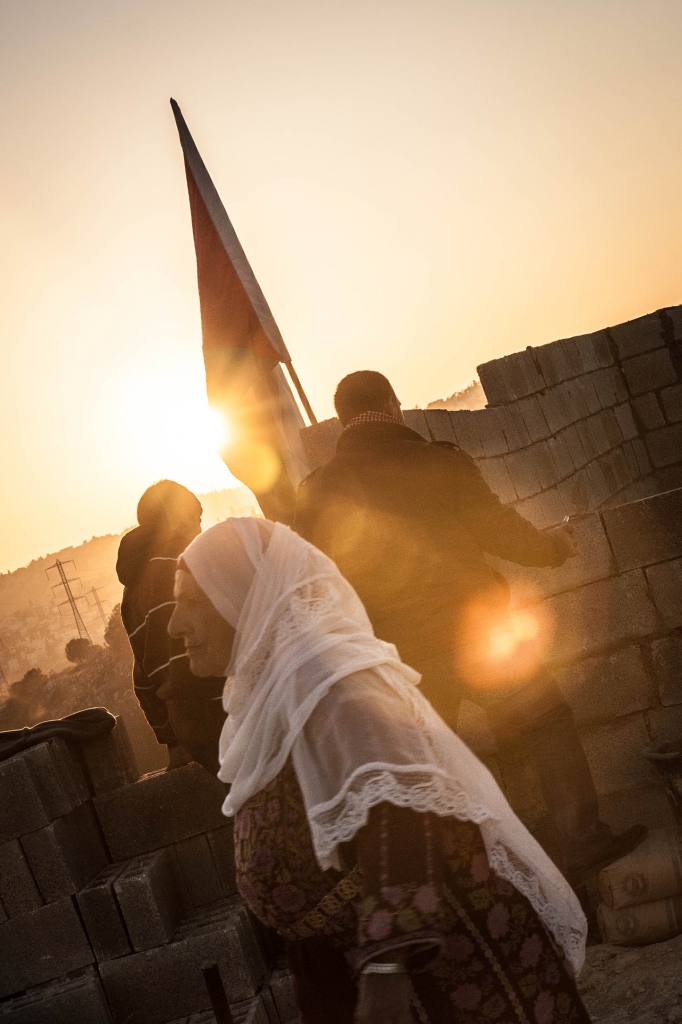
The palestinia protest village of Bab Al-Karama, Beit Iksa, January 2013. Two men in the background are building the provisional mosque.
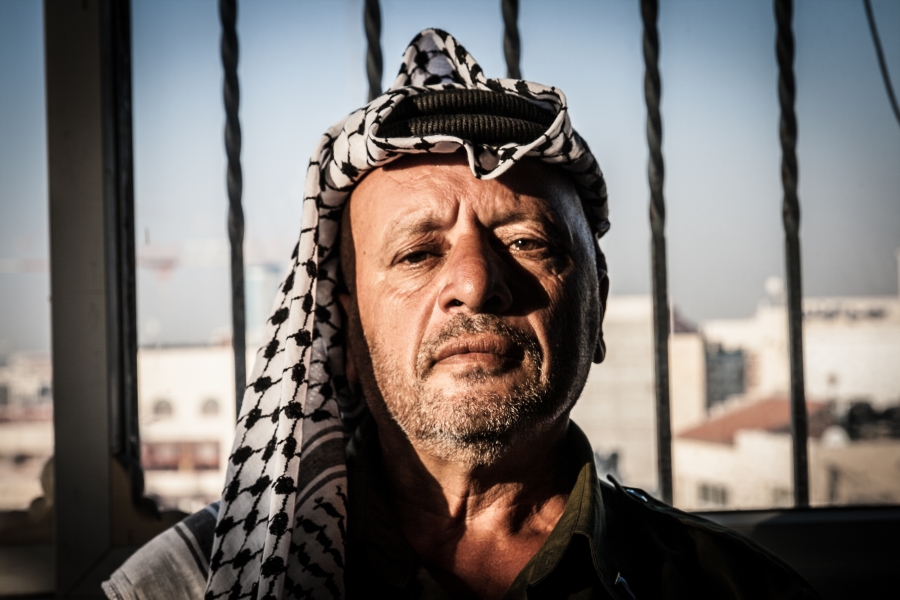
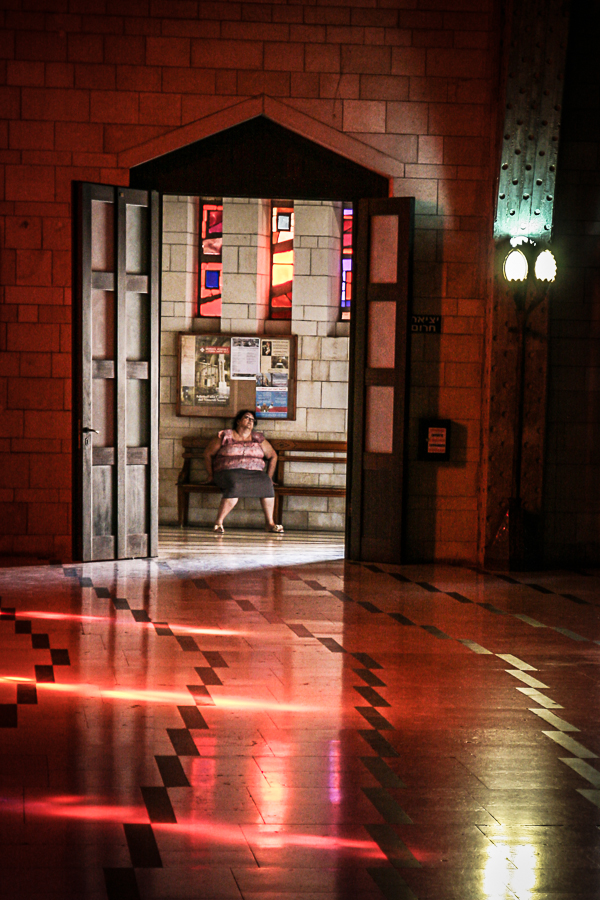
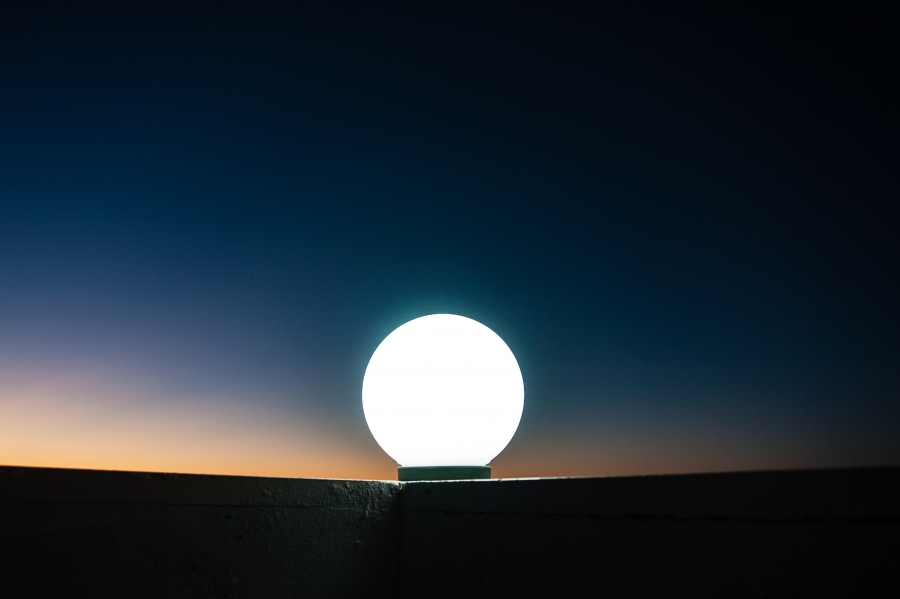
I wanted to take a picture of Wadi Musa in Jorda during sunset. However, the setting was rather unispiring. Then, I discovered this lamp and the longer I looked at it the more strange it seemed to me in this oriental place. It remembered me of Bauhaus-Design, neat, stylish. So I tried to fuse the heat of the Desert with the coolness of Bauhaus in this picture.
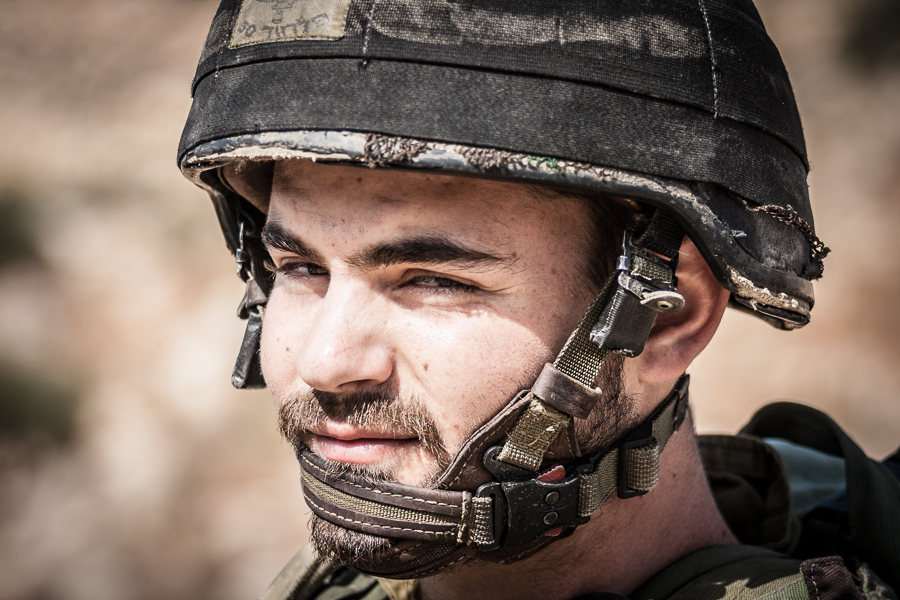
One of the soldiers we encountered at the Olive Tour, caught my attention because he looked like a big boy with a gun. He was born in Chicago and described his job in the West Bank as follows: “I protect the settlers from the Palestinians and the Palestinians from the Settlers.”
Hat Tip: While I was busy taking pictures and keeping my distance Vanessa just started talking to the soldier – and shared his story afterwards. Danke!Photojournalism Behind the Scenes [ITA-ENG subs] from Ruben Salvadori on Vimeo.
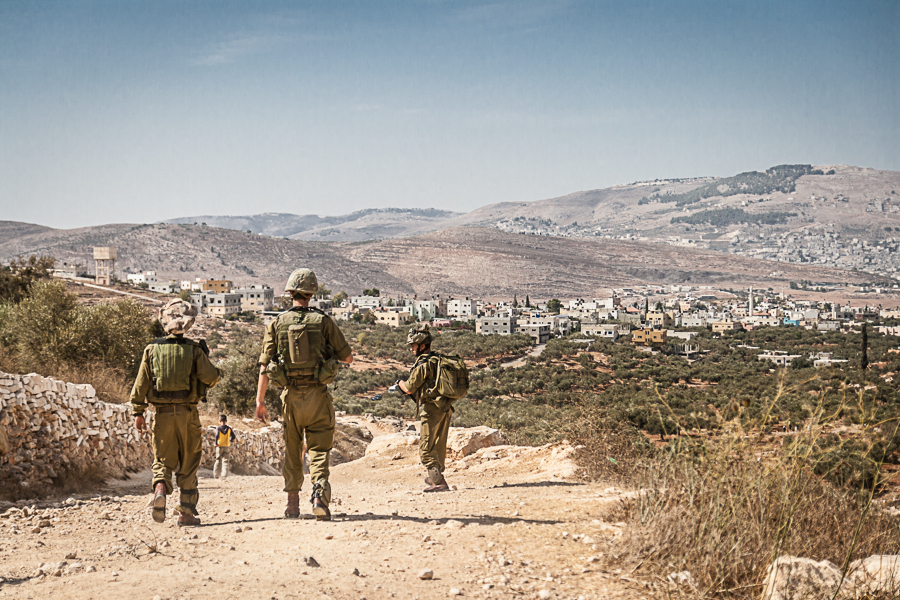
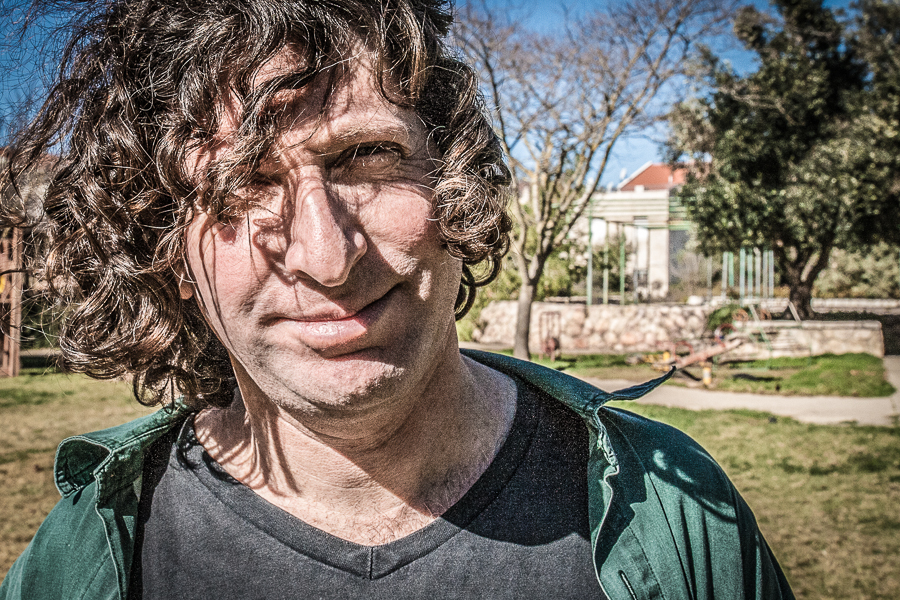
This is Eliaz Cohen, a remarkable man. A religious poet, a settler, a leftist. He was the reason I went to Kfar Etzion: I wrote a portrait of him for Zeit Online. My favorite poem of him:
SNOW
Snow on bleeding Jerusalem
as though bandaging her wounds
all rests in tranquility now
filling the cracks of yearning in the Wall
children in your streets, Jerusalem
the sons of Isaac and Ishmael
are staging white wars
(and their blows are soft)
even the pigeons are hurrying today
cooing because they have found new footprints
on the way leading up to the Gate of Mercy
